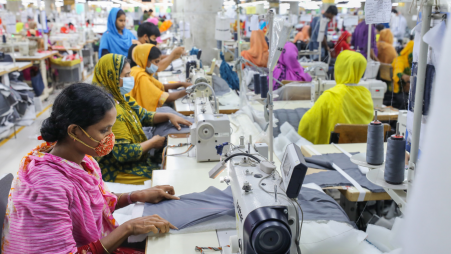Skilled workforce vital to tackling economic challenges, say experts at DCCI discussion

Bangladesh must focus more on developing a skilled workforce to meet the demands of a rapidly changing information technology-driven era. This requires modernising the overall education system, expanding technical and vocational education, ensuring proper training, and allocating adequate budgetary resources. At the same time, deeper collaboration between the education and industrial sectors is essential.
Speakers expressed these views at a roundtable discussion titled "Smart Human Resource Development in the Context of the Fourth Industrial Revolution," organised by the Dhaka Chamber of Commerce and Industry (DCCI).
Dr Nazneen Kauser Chowdhury, executive chairman of the National Skill Development Authority (NSDA), attended the discussion as the chief guest, held yesterday at the DCCI auditorium in Motijheel, Dhaka.
In his welcome address, DCCI President Taskeen Ahmed said the Fourth Industrial Revolution is not merely a technological shift but a deep transformation in production systems, business operations, and the labour market. Artificial intelligence (AI), in particular, is significantly influencing both industry and services, he noted.
Citing the World Economic Forum, he said nearly one-fourth of existing jobs will change within the next five years, and smart human resources will be Bangladesh's key strength in competing in the post-LDC era. Given this context, he emphasised the urgent need to overhaul the education system, strengthen technical education, and enhance coordination between academia and industry.
Chief guest Dr Nazneen Kauser Chowdhury said that the various government agencies providing skill development training lack coordination, and there is also a lack of awareness about workforce skill enhancement. She suggested linking human resource development with the Fourth Industrial Revolution and increasing collaboration between the public and private sectors.
Dr M Niaz Asadullah, visiting professor of economics at the University of Reading, UK, presented the keynote paper. Referring to a 2019 study by a2i and UNDP, he said automation and IT use may displace around 5.38 million jobs in Bangladesh's ready-made garments, food and agriculture, furniture, tourism, and hospitality sectors by 2030. To retain employment, he said, existing workers must be trained in using modern technology, and he proposed integrating advanced technologies into technical education.
Raisul Kabir, CEO of Brain Station 23, said the demand for faster and higher-quality work through AI is increasing. While AI may not drastically reduce employment, training and reskilling workers to meet future needs is essential.
Dr Mohammad Masroor Ali, professor at BUET's Department of Computer Science and Engineering, said it is time to emphasise technological education across both rural and urban areas.
Khan Mohammad Shafiqul Alam, regional senior manager of British American Tobacco, said corporate awareness and training initiatives, along with timely reforms to align education curricula with modern needs, are crucial.
M Sabbir Ali, head of corporate human resources at Transcom Group, said entrepreneurs need to be made more aware of the advantages of information technology and automation.
Mahtab Uddin Ahmed, president of the Institute of Cost and Management Accountants of Bangladesh (ICMAB), said only 20% of students find employment matching their skills, while about two million remain unemployed. To address this, he said, there is no alternative to expanding technical education.
Professor Dr Shams Rahman, vice-chancellor of East West University, said the country's education system is failing to produce a workforce aligned with industry needs. Therefore, coordinated efforts between education and industry are essential to developing skilled human resources.
Mohammad Saiful Hasan, joint secretary of the ICT Division and official of the Bangladesh Hi-Tech Park Authority, urged both local and foreign entrepreneurs to invest – individually or jointly – in the country's hi-tech parks.



 Keep updated, follow The Business Standard's Google news channel
Keep updated, follow The Business Standard's Google news channel
















